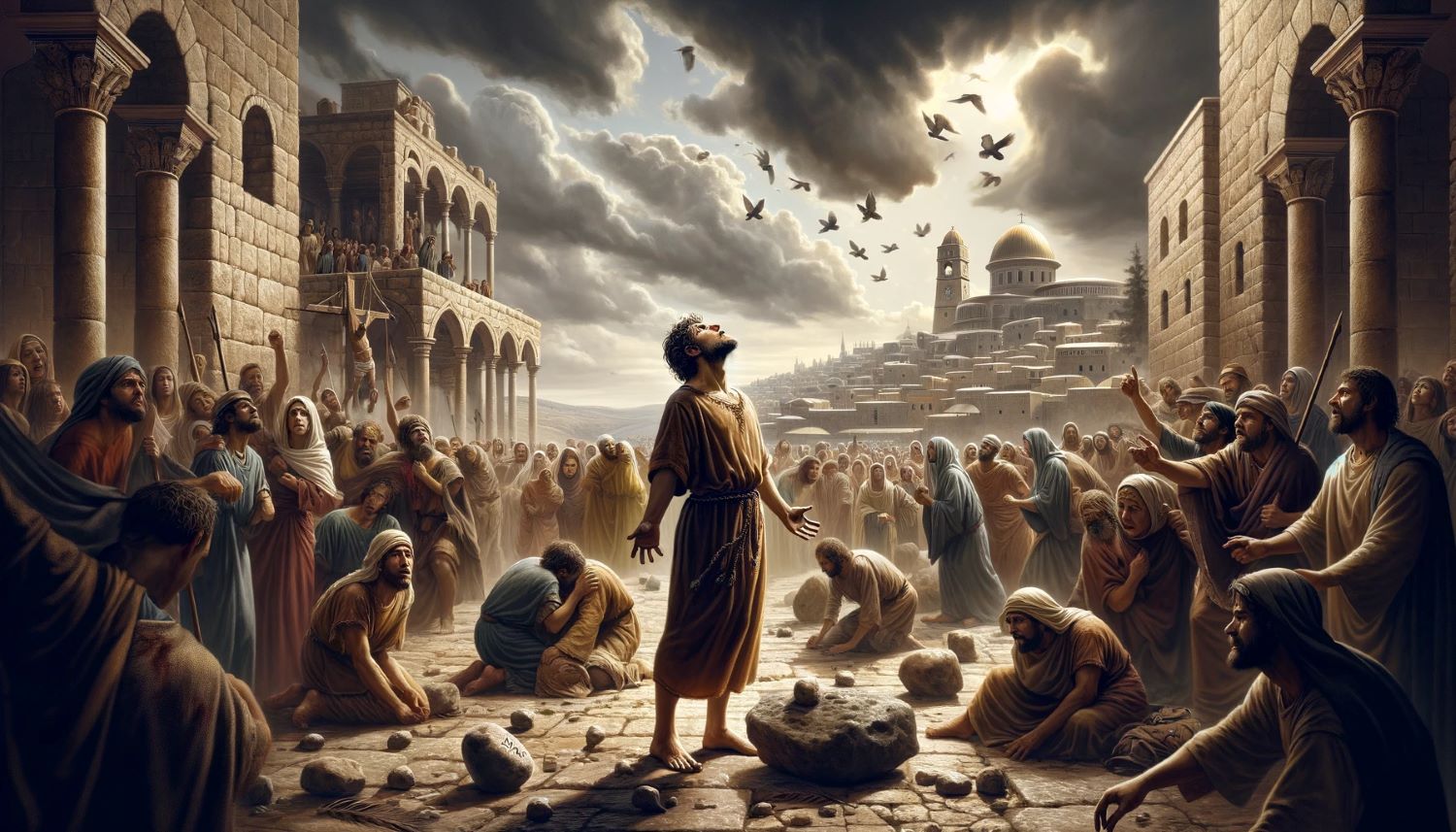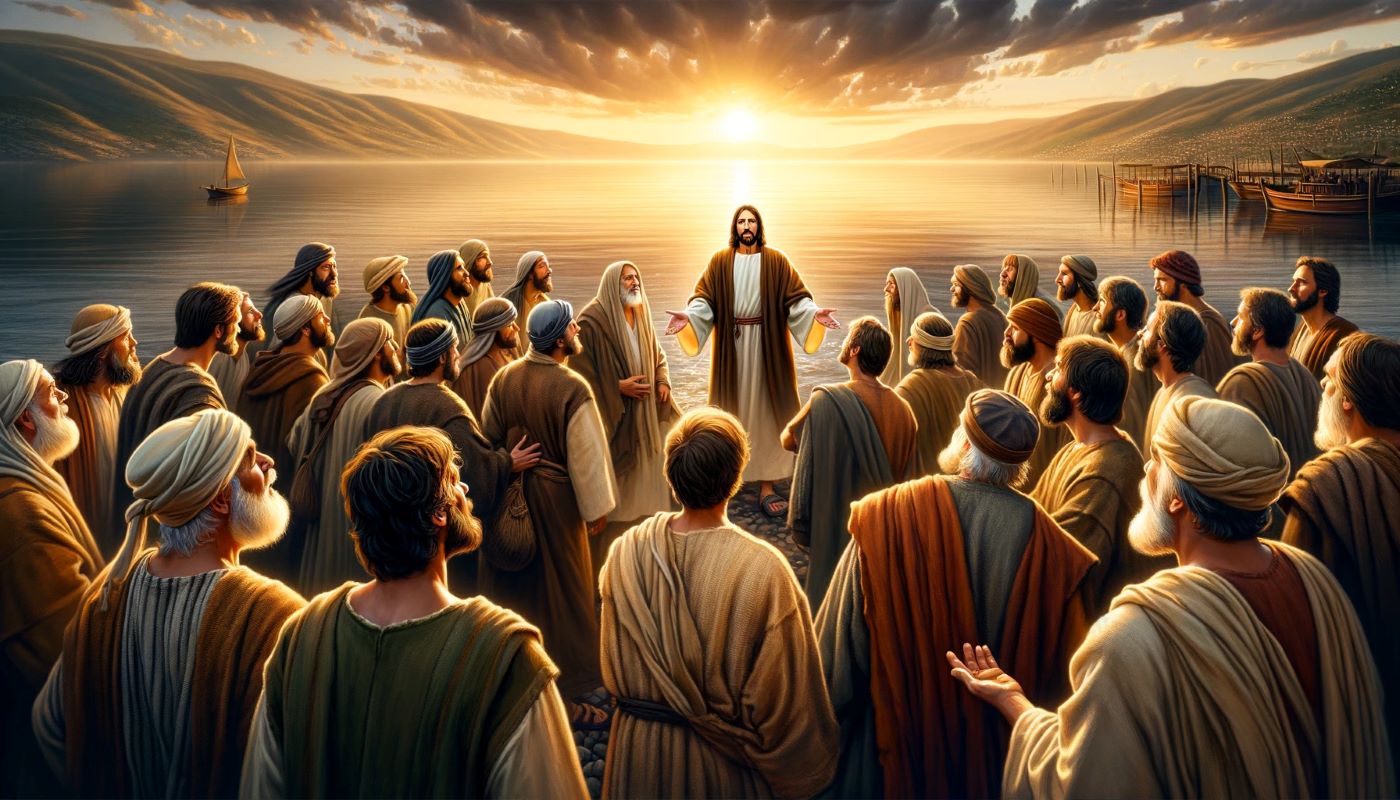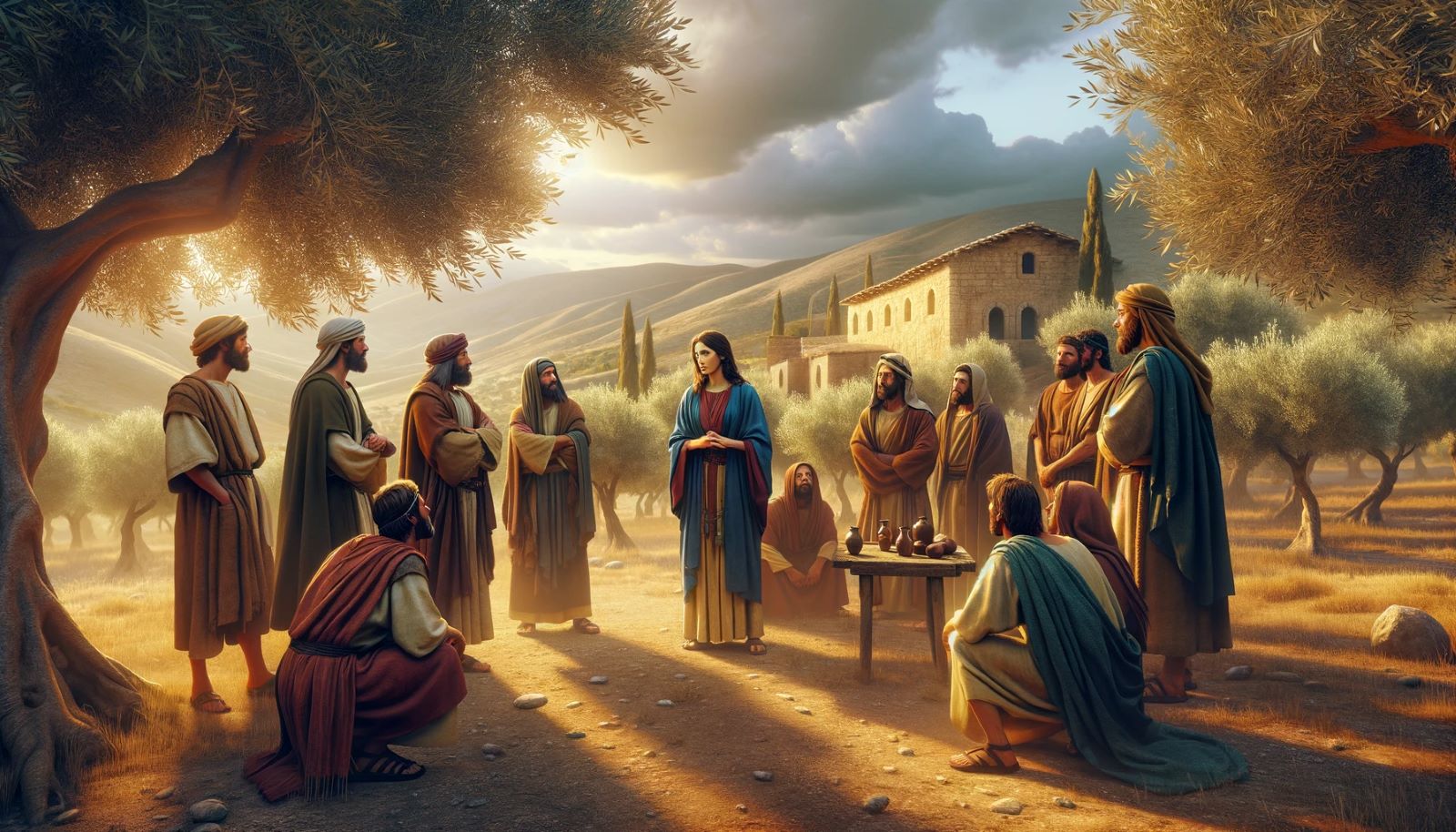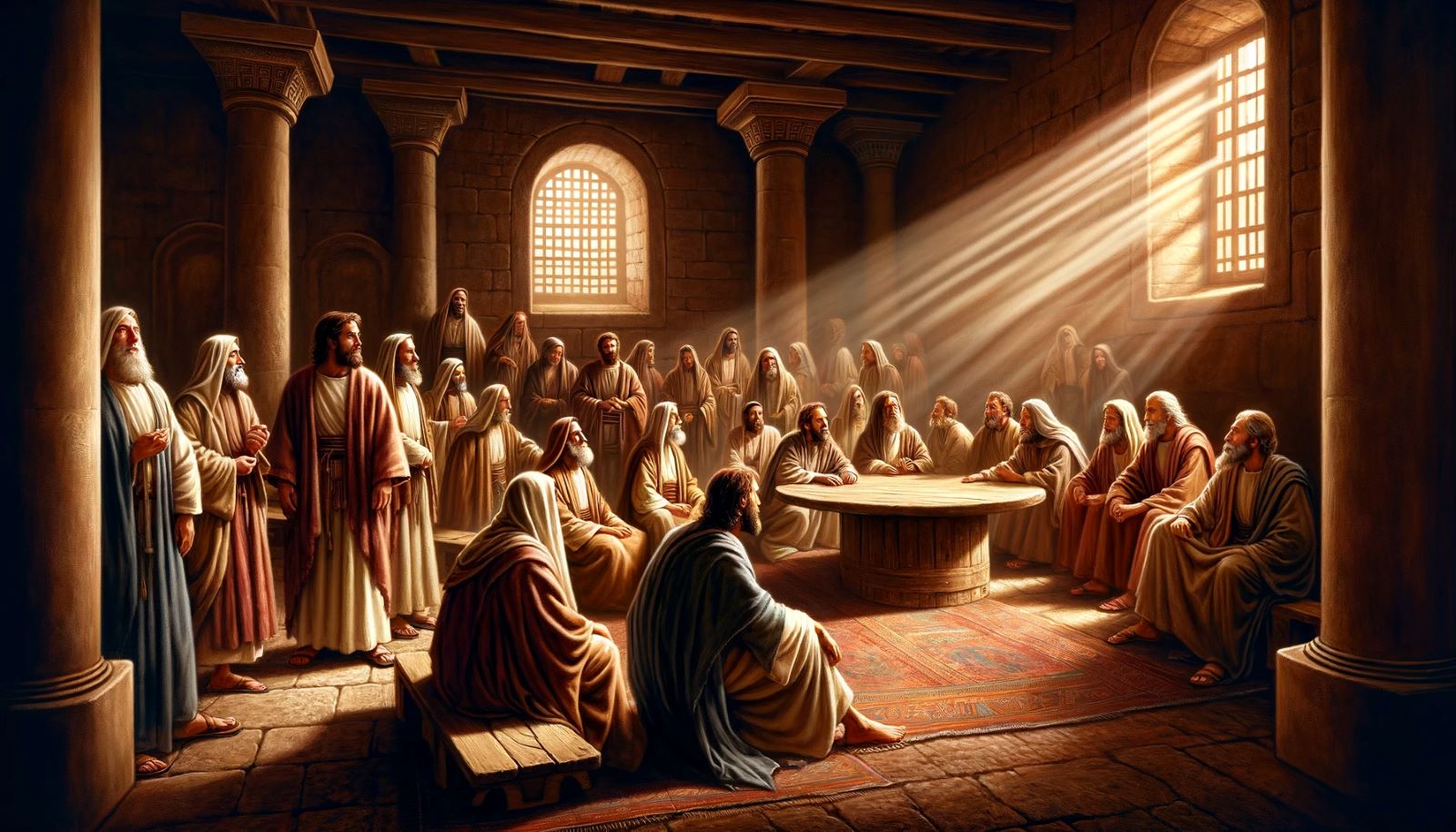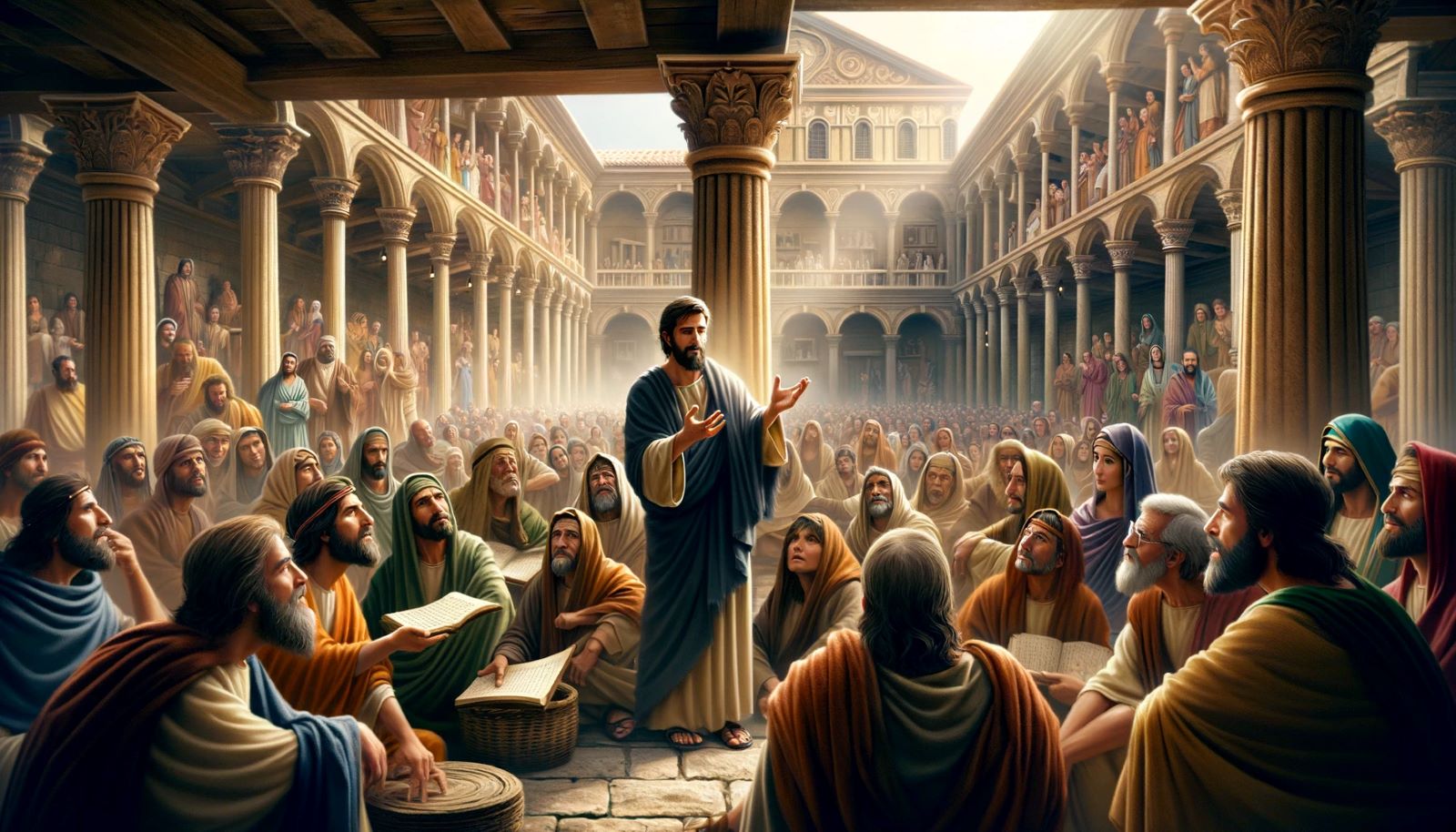Home>Bible Facts>How Many Apostles Were Martyred


Bible Facts
How Many Apostles Were Martyred
Published: February 22, 2024
Jason DeRose, Managing Editor at Christian.net, uses his expertise in religion and journalism to deepen understanding of faith's societal impacts. His editorial leadership, coupled with a strong academic background, enriches the platform’s diverse content, earning him recognition in both journalism and religious circles.
Discover the shocking truth about the number of apostles who were martyred in the Bible. Uncover fascinating Bible facts and insights. Explore now!
(Many of the links in this article redirect to a specific reviewed product. Your purchase of these products through affiliate links helps to generate commission for Christian.net, at no extra cost. Learn more)
Table of Contents
Introduction
The martyrdom of the apostles is a poignant and significant aspect of early Christian history. These devoted men, chosen by Jesus himself to spread his teachings, faced immense persecution and ultimately sacrificed their lives for their unwavering faith. Their courageous acts of martyrdom serve as a testament to the strength of their convictions and have left an indelible mark on the Christian faith.
The stories of the apostles' martyrdoms are deeply rooted in historical accounts and biblical traditions, offering profound insights into the challenges faced by the early followers of Christianity. Each apostle's journey and ultimate sacrifice are a testament to their unyielding commitment to spreading the message of Jesus Christ, despite the perils they encountered.
As we delve into the accounts of their martyrdoms, we gain a deeper understanding of the trials and tribulations endured by these remarkable individuals. Their unwavering dedication to their beliefs, even in the face of persecution and death, serves as a source of inspiration for Christians around the world.
The apostles' martyrdoms also underscore the profound impact of their teachings and the enduring legacy they left behind. Their willingness to endure suffering and death rather than renounce their faith exemplifies the profound spiritual strength that continues to resonate with believers today.
In the subsequent sections, we will explore the individual accounts of the martyrdoms of the apostles, shedding light on the unique circumstances and challenges they faced. Through these narratives, we honor the enduring legacy of these remarkable individuals and gain a deeper appreciation for the sacrifices they made in the name of their faith.
Read more: How Many James Were Apostles
The Martyrdom of Peter
The martyrdom of the apostle Peter stands as a testament to unwavering faith and unyielding commitment to the teachings of Jesus Christ. According to historical accounts and biblical traditions, Peter, also known as Simon Peter, was one of the twelve apostles chosen by Jesus and played a pivotal role in the early spread of Christianity.
Peter's martyrdom took place in Rome during the reign of Emperor Nero, a period marked by intense persecution of Christians. Tradition holds that Peter was crucified upside down at his own request, deeming himself unworthy to be crucified in the same manner as Jesus. This act of humility and selflessness exemplifies Peter's steadfast dedication to his faith, even in the face of imminent death.
The circumstances leading to Peter's martyrdom are steeped in the tumultuous political and religious climate of ancient Rome. As Christianity faced increasing hostility from the Roman authorities, Peter fearlessly continued to preach and uphold the teachings of Jesus, refusing to renounce his beliefs despite the grave dangers that loomed over him.
Peter's unwavering resolve and unshakable faith in the face of persecution serve as a profound example of spiritual fortitude and resilience. His willingness to endure the ultimate sacrifice rather than betray his convictions embodies the essence of Christian martyrdom and has inspired countless believers throughout the ages.
The martyrdom of Peter also holds immense significance in the establishment of the early Christian church. His steadfast commitment to spreading the gospel and his ultimate sacrifice contributed to the enduring legacy of Christianity, shaping its trajectory and inspiring future generations of believers.
The account of Peter's martyrdom serves as a poignant reminder of the sacrifices made by the early apostles in the name of their faith. It stands as a testament to the enduring power of conviction and the profound impact of unwavering dedication to spiritual beliefs, transcending time and continuing to resonate with Christians worldwide.
In commemorating the martyrdom of Peter, we honor his enduring legacy and draw inspiration from his unwavering commitment to the teachings of Jesus Christ, a legacy that continues to inspire and uplift believers across the globe.
The Martyrdom of Paul
The martyrdom of the apostle Paul stands as a testament to unwavering faith and unyielding commitment to the teachings of Jesus Christ. Paul, also known as Saul of Tarsus, was a fervent persecutor of Christians before his dramatic conversion on the road to Damascus, where he encountered the risen Jesus Christ. This transformative experience led Paul to become one of the most influential figures in the early spread of Christianity.
Paul's unwavering dedication to spreading the gospel and his fearless proclamation of the Christian faith incurred the wrath of both religious authorities and political powers. His tireless missionary journeys and fervent preaching of the gospel brought him into direct confrontation with entrenched belief systems and societal norms, leading to intense persecution and hardship.
The circumstances surrounding Paul's martyrdom are deeply intertwined with the political landscape of ancient Rome and the prevailing hostility towards the Christian community. Tradition holds that Paul, after enduring numerous hardships and imprisonments for his faith, met his martyrdom in Rome during the reign of Emperor Nero.
According to historical accounts and biblical traditions, Paul, as a Roman citizen, faced execution by beheading, a fate reserved for individuals of higher social standing. Despite the imminent threat to his life, Paul remained resolute in his commitment to the Christian faith, refusing to waver in the face of persecution.
Paul's martyrdom serves as a profound testament to the enduring legacy of his teachings and the indelible impact of his unwavering faith. His willingness to endure persecution and ultimately sacrifice his life for the sake of the gospel exemplifies the profound spiritual strength and resilience that characterized his ministry.
The martyrdom of Paul also holds immense significance in the annals of Christian history, underscoring the enduring legacy of his missionary zeal and unwavering commitment to spreading the message of Jesus Christ. His steadfast resolve in the face of persecution continues to inspire and uplift believers, serving as a timeless example of unwavering faith and dedication to the Christian cause.
In commemorating the martyrdom of Paul, we honor his enduring legacy and draw inspiration from his unwavering commitment to the teachings of Jesus Christ, a legacy that continues to inspire and uplift believers across the globe.
The Martyrdom of James the Greater
The martyrdom of James the Greater, one of the twelve apostles chosen by Jesus, stands as a testament to unwavering faith and steadfast commitment to the teachings of Christ. James, along with his brother John, was among the first disciples called by Jesus and played a significant role in the early spread of Christianity.
According to historical accounts and biblical traditions, James faced martyrdom in Jerusalem, becoming one of the earliest apostles to be executed for his unwavering dedication to the Christian faith. The circumstances leading to his martyrdom are steeped in the tumultuous political and religious climate of ancient Jerusalem, where early followers of Christianity encountered vehement opposition and persecution.
Tradition holds that James, also known as James the Greater to distinguish him from the other apostle named James, was put to death by the sword at the command of King Herod Agrippa I. His steadfast proclamation of the gospel and unwavering commitment to the teachings of Jesus Christ incurred the wrath of those who opposed the burgeoning Christian movement.
James' martyrdom serves as a poignant reminder of the sacrifices made by the early apostles in the name of their faith. His willingness to endure persecution and ultimately sacrifice his life for the sake of the gospel exemplifies the profound spiritual strength and resilience that characterized his ministry. His steadfast resolve in the face of persecution continues to inspire and uplift believers, serving as a timeless example of unwavering faith and dedication to the Christian cause.
The account of James the Greater's martyrdom underscores the profound impact of his unwavering commitment to spreading the message of Jesus Christ. His enduring legacy continues to resonate with Christians worldwide, inspiring them to uphold their faith with unwavering dedication and fortitude.
In commemorating the martyrdom of James the Greater, we honor his enduring legacy and draw inspiration from his unwavering commitment to the teachings of Jesus Christ, a legacy that continues to inspire and uplift believers across the globe.
The Martyrdom of Andrew
The martyrdom of the apostle Andrew stands as a testament to unwavering faith and unyielding commitment to the teachings of Jesus Christ. Andrew, the brother of Simon Peter, was among the twelve apostles chosen by Jesus and played a pivotal role in the early spread of Christianity. His journey as a disciple was marked by steadfast dedication and fervent proclamation of the gospel, despite the perils he encountered.
According to historical accounts and biblical traditions, Andrew faced martyrdom in the city of Patras in Achaea, a region of Greece. The circumstances leading to his martyrdom are steeped in the tumultuous political and religious climate of the time, where early followers of Christianity encountered vehement opposition and persecution. Andrew's unwavering commitment to spreading the message of Jesus Christ incurred the wrath of those who opposed the burgeoning Christian movement.
Tradition holds that Andrew, after enduring various forms of persecution for his faith, met his martyrdom through crucifixion on an X-shaped cross, which later became known as the St. Andrew's Cross. Despite the agonizing ordeal he faced, Andrew remained resolute in his commitment to the Christian faith, refusing to waver in the face of persecution. His willingness to endure the ultimate sacrifice rather than betray his convictions embodies the essence of Christian martyrdom and has inspired countless believers throughout the ages.
The martyrdom of Andrew holds immense significance in the annals of Christian history, underscoring the enduring legacy of his missionary zeal and unwavering commitment to spreading the message of Jesus Christ. His steadfast resolve in the face of persecution continues to inspire and uplift believers, serving as a timeless example of unwavering faith and dedication to the Christian cause.
Andrew's unwavering dedication to the gospel and his ultimate sacrifice contributed to the enduring legacy of Christianity, shaping its trajectory and inspiring future generations of believers. His martyrdom serves as a poignant reminder of the sacrifices made by the early apostles in the name of their faith and stands as a testament to the enduring power of conviction and the profound impact of unwavering dedication to spiritual beliefs, transcending time and continuing to resonate with Christians worldwide.
In commemorating the martyrdom of Andrew, we honor his enduring legacy and draw inspiration from his unwavering commitment to the teachings of Jesus Christ, a legacy that continues to inspire and uplift believers across the globe.
Read more: How Many Apostles Were Imprisoned
The Martyrdom of Thomas
The martyrdom of the apostle Thomas, also known as Doubting Thomas, is a compelling testament to unwavering faith and steadfast commitment to the teachings of Jesus Christ. Thomas, one of the twelve apostles chosen by Jesus, is best known for his initial skepticism regarding the resurrection of Jesus, a doubt dispelled when he encountered the risen Christ. His journey as a disciple was marked by a profound transformation, leading to unwavering dedication and fervent proclamation of the gospel.
According to historical accounts and biblical traditions, Thomas faced martyrdom in India, where he carried out missionary work following the ascension of Jesus. The circumstances leading to his martyrdom are steeped in the complex religious and cultural landscape of ancient India, where Thomas encountered both acceptance and vehement opposition to his teachings. Despite the challenges he faced, Thomas remained resolute in his commitment to spreading the message of Jesus Christ, refusing to waver in the face of persecution.
Tradition holds that Thomas, after enduring various forms of persecution for his faith, met his martyrdom through spearing, a fate he embraced with unwavering faith. His willingness to endure the ultimate sacrifice rather than betray his convictions embodies the essence of Christian martyrdom and has inspired countless believers throughout the ages.
The martyrdom of Thomas holds immense significance in the annals of Christian history, underscoring the enduring legacy of his missionary zeal and unwavering commitment to spreading the message of Jesus Christ. His steadfast resolve in the face of persecution continues to inspire and uplift believers, serving as a timeless example of unwavering faith and dedication to the Christian cause.
Thomas' unwavering dedication to the gospel and his ultimate sacrifice contributed to the enduring legacy of Christianity, shaping its trajectory and inspiring future generations of believers. His martyrdom serves as a poignant reminder of the sacrifices made by the early apostles in the name of their faith and stands as a testament to the enduring power of conviction and the profound impact of unwavering dedication to spiritual beliefs, transcending time and continuing to resonate with Christians worldwide.
In commemorating the martyrdom of Thomas, we honor his enduring legacy and draw inspiration from his unwavering commitment to the teachings of Jesus Christ, a legacy that continues to inspire and uplift believers across the globe.
The Martyrdom of Philip
The martyrdom of the apostle Philip stands as a poignant testament to unwavering faith and unyielding commitment to the teachings of Jesus Christ. Philip, one of the twelve apostles chosen by Jesus, played a significant role in the early spread of Christianity, fervently proclaiming the gospel and demonstrating unwavering dedication to his faith.
According to historical accounts and biblical traditions, Philip faced martyrdom in the city of Hierapolis in Phrygia, located in present-day Turkey. The circumstances leading to his martyrdom are steeped in the tumultuous religious and cultural landscape of the time, where early followers of Christianity encountered vehement opposition and persecution. Philip's steadfast commitment to spreading the message of Jesus Christ incurred the wrath of those who opposed the burgeoning Christian movement.
Tradition holds that Philip, after enduring various forms of persecution for his faith, met his martyrdom through crucifixion. His willingness to endure the ultimate sacrifice rather than betray his convictions embodies the essence of Christian martyrdom and has inspired countless believers throughout the ages. Philip's unwavering resolve in the face of persecution serves as a timeless example of unwavering faith and dedication to the Christian cause.
The martyrdom of Philip holds immense significance in the annals of Christian history, underscoring the enduring legacy of his missionary zeal and unwavering commitment to spreading the message of Jesus Christ. His steadfast dedication to the gospel and his ultimate sacrifice contributed to the enduring legacy of Christianity, shaping its trajectory and inspiring future generations of believers.
Philip's martyrdom serves as a poignant reminder of the sacrifices made by the early apostles in the name of their faith and stands as a testament to the enduring power of conviction and the profound impact of unwavering dedication to spiritual beliefs, transcending time and continuing to resonate with Christians worldwide.
In commemorating the martyrdom of Philip, we honor his enduring legacy and draw inspiration from his unwavering commitment to the teachings of Jesus Christ, a legacy that continues to inspire and uplift believers across the globe.
The Martyrdom of Bartholomew
The martyrdom of the apostle Bartholomew stands as a profound testament to unwavering faith and unyielding commitment to the teachings of Jesus Christ. Bartholomew, also known as Nathanael, was one of the twelve apostles chosen by Jesus and played a significant role in the early spread of Christianity. His journey as a disciple was marked by steadfast dedication and fervent proclamation of the gospel, despite the perils he encountered.
According to historical accounts and biblical traditions, Bartholomew faced martyrdom in various regions, with differing accounts of the circumstances leading to his ultimate sacrifice. One tradition holds that he preached the gospel in India and Armenia, where he encountered vehement opposition to his teachings. His unwavering commitment to spreading the message of Jesus Christ incurred the wrath of those who opposed the burgeoning Christian movement.
Tradition also suggests that Bartholomew, after enduring various forms of persecution for his faith, met his martyrdom through flaying, a brutal form of execution. His willingness to endure the ultimate sacrifice rather than betray his convictions embodies the essence of Christian martyrdom and has inspired countless believers throughout the ages. Bartholomew's steadfast resolve in the face of persecution serves as a timeless example of unwavering faith and dedication to the Christian cause.
The martyrdom of Bartholomew holds immense significance in the annals of Christian history, underscoring the enduring legacy of his missionary zeal and unwavering commitment to spreading the message of Jesus Christ. His steadfast dedication to the gospel and his ultimate sacrifice contributed to the enduring legacy of Christianity, shaping its trajectory and inspiring future generations of believers.
Bartholomew's martyrdom serves as a poignant reminder of the sacrifices made by the early apostles in the name of their faith and stands as a testament to the enduring power of conviction and the profound impact of unwavering dedication to spiritual beliefs, transcending time and continuing to resonate with Christians worldwide.
In commemorating the martyrdom of Bartholomew, we honor his enduring legacy and draw inspiration from his unwavering commitment to the teachings of Jesus Christ, a legacy that continues to inspire and uplift believers across the globe.
The Martyrdom of Matthew
The martyrdom of the apostle Matthew, also known as Levi, stands as a poignant testament to unwavering faith and unyielding commitment to the teachings of Jesus Christ. Matthew, a former tax collector who was chosen by Jesus as one of the twelve apostles, played a pivotal role in the early spread of Christianity. His journey as a disciple was marked by steadfast dedication and fervent proclamation of the gospel, despite the perils he encountered.
According to historical accounts and biblical traditions, Matthew faced martyrdom in Ethiopia, where he carried out missionary work following the ascension of Jesus. The circumstances leading to his martyrdom are steeped in the complex religious and cultural landscape of ancient Ethiopia, where Matthew encountered both acceptance and vehement opposition to his teachings. His unwavering commitment to spreading the message of Jesus Christ incurred the wrath of those who opposed the burgeoning Christian movement.
Tradition holds that Matthew, after enduring various forms of persecution for his faith, met his martyrdom through martyrdom by the sword. His willingness to endure the ultimate sacrifice rather than betray his convictions embodies the essence of Christian martyrdom and has inspired countless believers throughout the ages. Matthew's steadfast resolve in the face of persecution serves as a timeless example of unwavering faith and dedication to the Christian cause.
The martyrdom of Matthew holds immense significance in the annals of Christian history, underscoring the enduring legacy of his missionary zeal and unwavering commitment to spreading the message of Jesus Christ. His steadfast dedication to the gospel and his ultimate sacrifice contributed to the enduring legacy of Christianity, shaping its trajectory and inspiring future generations of believers.
Matthew's martyrdom serves as a poignant reminder of the sacrifices made by the early apostles in the name of their faith and stands as a testament to the enduring power of conviction and the profound impact of unwavering dedication to spiritual beliefs, transcending time and continuing to resonate with Christians worldwide.
In commemorating the martyrdom of Matthew, we honor his enduring legacy and draw inspiration from his unwavering commitment to the teachings of Jesus Christ, a legacy that continues to inspire and uplift believers across the globe.
Read more: How Many Of The Apostles Were Jewish
The Martyrdom of James the Less
The martyrdom of James the Less, also known as James the Just, offers a poignant testament to unwavering faith and steadfast commitment to the teachings of Jesus Christ. As one of the twelve apostles chosen by Jesus, James played a pivotal role in the early propagation of Christianity, fervently proclaiming the gospel and demonstrating unwavering dedication to his faith.
According to historical accounts and biblical traditions, James faced martyrdom in Jerusalem, becoming one of the earliest apostles to be executed for his unwavering commitment to the Christian faith. The circumstances leading to his martyrdom are steeped in the tumultuous political and religious climate of ancient Jerusalem, where early followers of Christianity encountered vehement opposition and persecution.
Tradition holds that James, also known as James the Just for his righteous character, was thrown from a pinnacle of the temple and subsequently stoned to death by a hostile mob. His steadfast proclamation of the gospel and unwavering commitment to the teachings of Jesus Christ incurred the wrath of those who opposed the burgeoning Christian movement.
James' martyrdom serves as a poignant reminder of the sacrifices made by the early apostles in the name of their faith. His willingness to endure persecution and ultimately sacrifice his life for the sake of the gospel exemplifies the profound spiritual strength and resilience that characterized his ministry. His steadfast resolve in the face of persecution continues to inspire and uplift believers, serving as a timeless example of unwavering faith and dedication to the Christian cause.
The account of James the Less' martyrdom underscores the profound impact of his unwavering commitment to spreading the message of Jesus Christ. His enduring legacy continues to resonate with Christians worldwide, inspiring them to uphold their faith with unwavering dedication and fortitude.
In commemorating the martyrdom of James the Less, we honor his enduring legacy and draw inspiration from his unwavering commitment to the teachings of Jesus Christ, a legacy that continues to inspire and uplift believers across the globe.
The Martyrdom of Simon the Zealot
The martyrdom of Simon the Zealot, one of the lesser-known apostles chosen by Jesus, offers a compelling testament to unwavering faith and steadfast commitment to the teachings of Christ. Simon, also known as Simon the Cananaean or Simon the Zealot, was a fervent advocate for the message of Jesus Christ and played a significant role in the early propagation of Christianity.
According to historical accounts and biblical traditions, Simon faced martyrdom in Persia, where he carried out missionary work following the ascension of Jesus. The circumstances leading to his martyrdom are steeped in the complex religious and cultural landscape of ancient Persia, where Simon encountered both acceptance and vehement opposition to his teachings. His unwavering commitment to spreading the message of Jesus Christ incurred the wrath of those who opposed the burgeoning Christian movement.
Tradition holds that Simon, after enduring various forms of persecution for his faith, met his martyrdom through crucifixion. His willingness to endure the ultimate sacrifice rather than betray his convictions embodies the essence of Christian martyrdom and has inspired countless believers throughout the ages. Simon's steadfast resolve in the face of persecution serves as a timeless example of unwavering faith and dedication to the Christian cause.
The martyrdom of Simon the Zealot holds immense significance in the annals of Christian history, underscoring the enduring legacy of his missionary zeal and unwavering commitment to spreading the message of Jesus Christ. His steadfast dedication to the gospel and his ultimate sacrifice contributed to the enduring legacy of Christianity, shaping its trajectory and inspiring future generations of believers.
Simon's martyrdom serves as a poignant reminder of the sacrifices made by the early apostles in the name of their faith and stands as a testament to the enduring power of conviction and the profound impact of unwavering dedication to spiritual beliefs, transcending time and continuing to resonate with Christians worldwide.
In commemorating the martyrdom of Simon the Zealot, we honor his enduring legacy and draw inspiration from his unwavering commitment to the teachings of Jesus Christ, a legacy that continues to inspire and uplift believers across the globe.
The Martyrdom of Matthias
The martyrdom of Matthias, the apostle chosen to replace Judas Iscariot, stands as a poignant testament to unwavering faith and unyielding commitment to the teachings of Jesus Christ. Matthias, who was selected through a process of prayer and casting of lots to join the ranks of the twelve apostles, embraced his role with fervent dedication and resolute faith.
According to historical accounts and biblical traditions, Matthias faced martyrdom in the region of Judea, where he carried out his ministry following the ascension of Jesus. The circumstances leading to his martyrdom are steeped in the tumultuous religious and political landscape of ancient Judea, where early followers of Christianity encountered vehement opposition and persecution. Matthias' steadfast commitment to spreading the message of Jesus Christ incurred the wrath of those who opposed the burgeoning Christian movement.
Tradition holds that Matthias, after enduring various forms of persecution for his faith, met his martyrdom through stoning, a fate he embraced with unwavering faith. His willingness to endure the ultimate sacrifice rather than betray his convictions embodies the essence of Christian martyrdom and has inspired countless believers throughout the ages. Matthias' steadfast resolve in the face of persecution serves as a timeless example of unwavering faith and dedication to the Christian cause.
The martyrdom of Matthias holds immense significance in the annals of Christian history, underscoring the enduring legacy of his unwavering commitment to spreading the message of Jesus Christ. His steadfast dedication to the gospel and his ultimate sacrifice contributed to the enduring legacy of Christianity, shaping its trajectory and inspiring future generations of believers.
Matthias' martyrdom serves as a poignant reminder of the sacrifices made by the early apostles in the name of their faith and stands as a testament to the enduring power of conviction and the profound impact of unwavering dedication to spiritual beliefs, transcending time and continuing to resonate with Christians worldwide.
In commemorating the martyrdom of Matthias, we honor his enduring legacy and draw inspiration from his unwavering commitment to the teachings of Jesus Christ, a legacy that continues to inspire and uplift believers across the globe.
